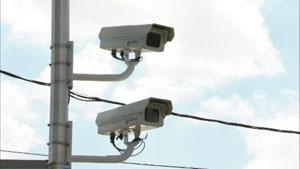
Not many companies could stay in business long if they collected only 55 percent of their billings. That’s what American Traffic Solutions of Phoenix, Arizona, is taking in from Fayetteville violators who run video-monitored red lights. An updated report prepared for Up & Coming Weekly indicates that 7,657 citations were issued since the program began last summer.
City of Fayetteville Spokesman Kevin Arata says the new data is for the calendar year ending Dec. 31. A total of 4,257 citations of $100 each were paid for a gross total of $425,000. Sixty-five percent of the proceeds or $276,000 goes to Cumberland County Schools, as provided by law. American Traffic Solutions keeps the rest.
“There is no cost to the city,” says Traffic Engineer Lee Jernigan. Jernigan estimates the school system can likely depend on about $800,000 a year in red light citation revenue.
What about the 3,400 violators who haven’t paid the fines? They “are assessed late fees of $100 if they aren’t paid within a 30-day timeframe,” according to Arata. After that, the company would have to take the violaters to small-claims court. Because the citations are civil violations, no records of them are shown on drivers’ licenses or insurance reports.
Records provided by the city indicate three of the intersections monitored by the cameras have accounted for nearly 50 percent of the tickets. They are Skibo at Morganton Road, Ramsey Street at Law Road and South Reilly at Kimridge Road. Jernigan says it will take several months to determine whether the red light cameras are having the desired effect of reducing auto accidents.

Fundraiser Set for Homeless Shelter
Fayetteville’s Operation Inasmuch plans to begin construction of its new shelter for homeless men this winter with occupancy in the fall. The agency is promoting what it calls a “Drive-thru Fundraiser” for the shelter at Hillsboro and Chance Streets across from its ministry center on Jan. 31. Executive Director Sue Byrd says $200,000 has already been raised or pledged; the estimated cost of the shelter is $500, 000.
The facility will be built “in keeping with the construction and finishes of the seven Frink Street homes” owned by the charity says Byrd. The fenced-on, 6,500 sq. ft. single-story building will front Chance Street as a limited-access facility with the main entry enabled with a security buzzer and security glass. The police department will install a surveillance camera that can be monitored 24/7. The shelter will also nclude an office or the police department’s homeless project police officer. The shelter will be staffed day and night with paid staff or volunteers.
Byrd says the building will have beds for 40 men, with standard rest room facilities including two handicapped accessible rest rooms. A day room will have TVs and will provide space for group meetings. A laundry will include three clothes washers and three dryers. On life threatening, cold ‘white flag’ nights, the facility will serve an additional 15 to 25 men.
Typically the shelter will open at 6 p.m. to receive men who were pre-registered earlier in the day at the Operation Inasmuch Ministry Center, according to Byrd. “There will be no long lines of people waiting to get in,” she said. The next day, residents must be up and out by 7:15 a.m. They will be served breakfast at Inasmuch across the street.
Scholarships for Children of Veterans
College scholarships are available for eligible high school seniors who are the children of North Carolina veterans. The scholarships are provided by the North Carolina Department of Military and Veterans Affairs and the North Carolina Association of Veterans Services Officers.
The Military and Veterans Affairs Department manages scholarships for children of certain categories of deceased, disabled, combat or POW/MIA vets. They provide four years of tuition and fees at approved North Carolina state universities. Students who choose to attend private schools are given vouchers of $4,500 a year for eight semesters over eight years. Qualifications and applications are available online at www.milvets.nc.gov.
The scholarships from the Association of Veterans Services Officers were established to honor members. They’re open to graduating seniors whose parents are honorably discharged state residents. The scholarships pay $1,000. Applications are available at the Cumberland County Veterans Services Office at 301 E. Russell St.

Voter ID Required This Year
For the first time in more than 100 years, North Carolina voters are required to show photo ID at the polls. Five years ago, the Republican-controlled North Carolina General Assembly changed voting laws that had been in effect since 1896. The Cumberland County Board of Elections says acceptable photo IDs include North Carolina driver’s licenses or ID cards, passports, military ID cards, Veterans Administration cards and certain tribal ID cards. Options for citizens who don’t have or are not able to obtain ID cards can be found online at voterID.nc.gov.
The Board of Elections’ early voting schedule was created after receiving input from the public. Early voting times and dates are:
Board of Elections Office (227 Fountainhead Lane)- March 3, 4, 7-11 from 8 a.m. – 8 p.m.; March 5 from 9 a.m. – 5 p.m.; March 12 from 9 a.m. – 1 p.m.
Cliffdale Recreation Center, East Regional Branch Library, Hope Mills Recreation Center and North Regional Branch Library- March 3, 4, 7-11 from 10 a.m. – 8 p.m.; March 5 from 9 a.m. – 5 p.m.; March 12 from 9 a.m. – 1 p.m.
Health Dept. Receives Grant
The North Carolina Department of Health and Human Services has awarded the Cumberland County Health Department a $300,000 grant for the Adolescent Parenting Program . This program serves pregnant teens and mothers who are 19 or younger at the time of enrollment. The APP is a teen pregnancy prevention program developed to help prevent second pregnancies. It’s administered by the North Carolina Department of Health and Human Services, Division of Public Health and the Family Planning and Reproductive Health Unit.
The goals are to increase self-sufficiency, increase high school graduation rates or completion of GEDs and improve the welfare of children of teen parents. APP also hopes to increase incidence of positive parenting and increase children’s physical well-being by creating safe home environments.
The Health Department will receive $75,000 annually for four years beginning June 1, 2016. Pregnant teens must be enrolled at any stage of their pregnancy and may remain in the program until they graduate from high school or complete a GED. The program is coordinated by a full-time public health staff member with an average caseload of between 15 and 25 participants annually. It includes home visitation and peer group education sessions.
Cumberland County was targeted for funding based on its five-year average teen pregnancy rate of 63.6 percent from 2009-2013, which ranked 12th highest in the state.

 How to resolve AdBlock issue?
How to resolve AdBlock issue? 








